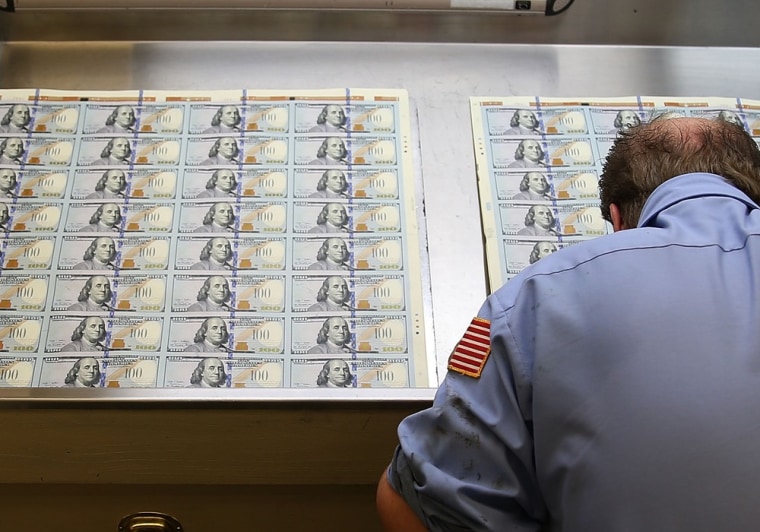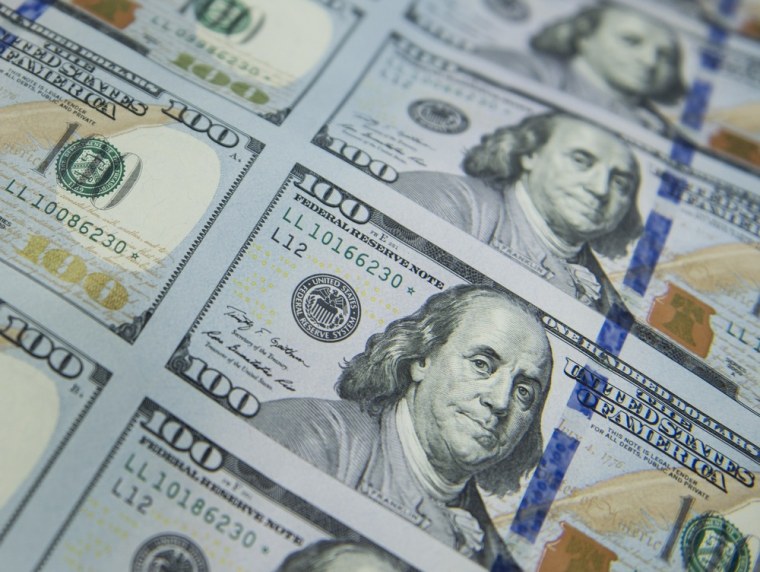
Washington’s brush with default this week has renewed debate about the future of the U.S. dollar as the world’s reigning currency – a position the greenback has held for nearly 70 years.
Any American who has stocked up on pesos before a trip to Cancun might not realize the extent to which the global economy depends on the familiar bills already in their wallet.
Because the United States still has a dominant economy, a strong banking system and a stable government, the dollar remains the grease for the world’s financial works.
Some 80 percent of foreign exchange transactions are conducted with dollars, and American money accounts for more than 60 percent of overseas reserves, the investments that foreign governments and banks sock away.
Oil is bought and sold around the world in dollars. Foreign currencies are measured against them. And when there’s a crisis, even one wrapped in red, white and blue, world investors seeking stability buy American green.
That means the U.S. government can borrow money cheaply, and it means Americans pay less for their homes and cars.
“The dollar’s status as the global reserve currency helps lower borrowing rates for all Americans across the board, not just for the government,” said Harvard economist Kenneth Rogoff.
But some economists predict the era of dollar dominance is drawing to a close, a process that could be hastened if there’s a repeat of the shenanigans at the Capitol that brought the country to the brink of not being able to pay its bills and had the Chinese calling a "de-Americanized world order."
It’s a scenario, experts say, that could have far-reaching consequences for the U.S. and other economies.
Barry Eichengreen, author of “Exorbitant Privilege: The Rise and Fall of the Dollar and the Future of the International Monetary System,” estimates that toppling the dollar from its throne could cost the U.S. 2 percent of its economic output.
There would be a run on other currencies, and “there won’t be enough Swiss francs to go around,” Eichengreen said.
Increased demand for other currencies would cause a spike in their value, which would wreak havoc with the exports of struggling and rapidly growing countries, he said.

Even without a crisis like a default, many experts think the dollar’s days as the only game in town are numbered, with the world slowly moving toward a multi-currency reserve system.
If the dollar were no longer No. 1, what would replace it?
“The country that takes over would have to have a strong central bank, a strong banking system... and securities markets people can come in and out of freely and that are trustworthy,” said Scott Pardee, a former Federal Reserve official and monetary economics professor at Middlebury College in Vermont.
It turns out there aren’t many nations that fit that bill.
Britain, Canada and Switzerland’s economies are too small, and Japan’s has been in the doldrums for 20 years, said C. Fred Bergsten, the founding director of the Peterson Institute for International Economics.
China has cosseted its markets, does not allow the yuan to be freely exchanged, and is still building its financial infrastructure, Bergsten said.
The euro represents countries with economic and financial markets that, collectively, approach those of the United States, but it provides no substitute for Treasury bills. Scars from Europe’s own economic crisisare still fresh, and a currency that depends on the economies of 17 countries could be seen as too volatile.
Yet Eichengreen sees a day in the not-too-distant future when the euro zone will have proven stability and e-bonds and China will have grown and modernized – and the euro and yuan will be attractive enough to take over a big chunk of the dollar’s turf.
“In my book, I talk about 10 to 20 years,” said Eichengreen.
If the dollar’s monopoly were to end, it would be costly.
“The U.S. loses three things,” Eichengreen says.
“We lose the convenience of being able to do business in other countries in our own currency. We lose the ability to borrow more cheaply than anyone else. And we lose the insurance policy that comes with the dollar’s safe-haven status.”
Bergsten agrees there would be short-term pain but said that in the long run, a less important dollar would be good for the country.
“I think the international role of the dollar is bad for the U.S. It makes it too easy to finance our deficits. We are on a very long leash,” he said.
“Money comes in here and that relaxes or even avoids the real market pressure on us to force us to get our house in order,” he added. “We like competition among products, why not among currency?”
Despite the billions that the U.S. has saved in interest, transaction costs and other perks of dollar dominance, Pardee said the evolution of several reserve currencies would not necessarily be disastrous.
After all, Britain, the world's economic capital since World War II, survived having the pound sterling replaced by the dollar as the world's leading currency.
“The fact that sterling is no longer the international reserve currency has not hampered the sale of oil from the North Sea or Scotch Whiskey or Beatles records,” he said.
And Rogoff thinks reports of the dollar’s death have been greatly exaggerated.
“There is little chance of any currency displacing the dollar within the next two decades, and the dollar’s dominance will likely remain long after that,” he said.
Related: